- Home
- Lloyd Jones
The Book of Fame Page 2
The Book of Fame Read online
Page 2
‘Warmer weather as we go north. Chief Engineer took some snapshots of Heaven. Cunningham’s knowledge of scrumwork proving invaluable.
Aug 23. Most of us are stripped down to our football togs all day.
Aug 29. Hottest day yet. Not a breath of wind and the sea is gluey. Passed a shoal of porpoises …
Crossed the Equator this morning and immediately changed course out to the Atlantic …’
That evening we gathered up the pumpkins to make space to dance. Mister Dixon handed out dance cards. In addition to the piano, we had a violin and piccolo orchestra. There were only six ladies to go round, plus Cunningham in fancy dress; the rest of us danced with dummies. On the stroke of midnight Jimmy Duncan gave each of us a gentle shoulder-tap reminder that we had training in the morning, and one by one we sloped back to our bunks to swap notes.
MONA THOMPSON’S DANCE CARD
Dances Partners
Grand March farmer’s wife, mother of
Waltz ‘Teresa’ (I think). Picked her glove up from the deck. Brown quail-like freckles on breast
Lancers blue dress one, almond eyes pretty scar tissue beneath left eye
Waltz Massa Johnston’s honey
Barn Dance blonde Venezuelan whose laughter we hear during dinner
Polka ‘Anna’? drew a llama on Jimmy Hunter’s menu
Waltz Senorita Boa. At ‘debates’ said the word for story and history is the same in German and Mister Dixon got involved
Lancers ‘Cecilia’? yellow ribbon, lemur wrap, glassy eyes & teeth
Waltz Teresa
‘September 1. In hot humid conditions we held the finals of the sports events—
Harper and Hunter, a dead heat in the potato race
Glasgow, the pillow fight
Booth, the sack race
Thompson, the obstacle course
Mynott, quoits
Hunter, arm wrestling
Gallaher, “chalking the deck” ’
Tenerife. Blessed land. In Santa Cruz we took a ball ashore. Freddy Roberts persuaded a number of Arab fig vendors to form a line and oppose us in lineout drill. Cunningham jumped well, secured good ball.
Jimmy Duncan got everyone to pull on a face plate and swim out to the reef to watch the shoal behaviour of fish.
We filled ourselves with fruit, then it was back out to the Atlantic.
For a fancy costume ball hosted by the passengers of the First Saloon, Nicholson dressed as a tramp, Newton as a ‘disreputable working woman’, Tyler as a ‘nigger minstrel’, Cunningham as Chief Steward, Harper a gaucho, Thompson as the strongman, Eugene Sandow; Glasgow showed up as a tattooed warrior, Mackrell and Roberts as clowns. Nicholson’s costume won him first prize.
‘September 4. Weather cooler. Everyone training vigorously except
O’Sullivan, down with sunstroke.
Counting the days now.
September 5. Passed Cape Finisterre.’
Close to forty days we’d been at sea. We developed a morbid shipboard stare, hanging off the rails, gazing down as though into our very graves.
We had forgotten the point of newspapers. We stopped talking as if none of that mattered either. Players withdrew, the big men to a ledge deep inside themselves. Nicholson, ‘the song bird’, fell quiet.
At our lowest ebb England answered. She sent out signals that she was near. The seas thickened with fishing boats and marker buoys. Late in the day, a large cruiser steamed by in the opposite direction to ourselves. We ran to that side of the ship and waved but no one waved back. Casey said he saw a woman with a cocktail drink in a gloved hand.
That last night at sea we sat up late writing postcards of Arabs and pyramids we’d bought in Tenerife ready to send home the moment we stepped ashore.
Before dawn the boys were up on deck, leaning against the rails, smoking their pipes. In the darkness we bumped into one another—
‘Gidday farmer’
‘That you, Bunny?’
‘No, it’s your mother …’
‘Jimmy, what are you doing up?’
We were embarrassed to be found so wanting.
Crouched by an oil lamp Eric Harper concluded his letter: ‘The English shores are in sight and the excitement is too great to continue …’
In the dark, England came to us in a series of noises—
Foghorns. Ships’ whistles. Hissing.
We strained to make her out. None of us spoke. Each of us entertained a private notion of what England should be like.
‘There she is …’ Mister Dixon it was.
Anyway we all looked. And there she was!
England. A crane poking through the fog. Now the rest of England passed through the hole in the fog—rooftops, beyond them the dark shadows of hills. Within those shadows, outlines of cottages, roofs. The view began to jam and our eyes raced from one piece of the jigsaw to the next.
We tried to locate something of what our parents had said, or a vista passed down by our grandparents.
One or two of the players argued with the view. ‘No, that’s not right.’ The woman from the cake shop in Cuba Street had told Billy Wallace to expect English roses. For forty days at sea he had been preparing himself for a botanic experience.
England was a muddled picture to start with. We found ourselves trying to disassemble what we saw from what we knew or had heard or read of a storybook past—the sound of horses, their shocking emergence out of the mist, famous wars, heaths and witches’ brew.
A coal hulk came into view and immediately a homely knowledge descended over Corbett.
Jimmy Duncan needlessly reminded Tyler, ‘That’s England, son.’ and Tyler looked for the tower he had only seen illustrated in Dick Whittington and his Cat.
A seagull’s cry reminded Cunningham of all the lonely coasts he’s known, the place of dreams.
In the emerging light Dave Gallaher looked back for the Plymouth headland, that shaven bit that meets the sea that we passed in the dark. It could be North Head at the entrance to the Manukau.
Johnston’s expression is one of disapproval. He’s just seen three men struggling with a box and calculates that it should only take two men to carry it. The third one, he figures, is bluffing.
Smith, the former jockey, glances up. The sky comes and goes. He looks down at the grey sea and feels a shooting sensation in his heart.
Mister Dixon is all smiles as he mentally composes a letter to his ‘Dear Emma …’
Alec McDonald, at someone’s insistence, scrutinises a brick building and winces as someone else insists: ‘No, but really, it’s different from ours …’
There is a sound of wood on wood as the tender brushes alongside the SS Rimutaka. At that moment Bunny Abbott hears doors creaking in the bush—he blinks—and seeing it’s England, colour enters his cheeks. A hunter’s excitement catches in his throat. He swears quietly to himself.
‘Aha! There!’ Deans points to the first spire.
Glasgow is first to smell England’s old, official air—something like leakage from a five-pound note.
Freddy Roberts juggles the ball in his hands. He can’t wait to get on land.
Mackrell holds back a hacking cough behind a closed hand in case the English might hear and get the wrong impression.
The artist from Uruguay points out to Mona Thompson a different palette. He can identify some of the colours, but not all. ‘That, for example,’ he says of the grey light.
The O in O’Sullivan’s mouth is pronounced—he has the muddled idea that he’s been here before.
Jimmy Hunter stares into the fog, thinking how mid-morning around Wanganui on an autumn’s day, the hills are suddenly dreamt into existence.
Seeling switches his weight from foot to foot, nodding blindly whenever something of interest is pointed out.
The slightly wounded look developed at sea shows no sign of leaving Steve Casey. A whole itinerary of places are lodged in his face—beginning with lonely icebergs, the unknown wilds of Patagonia, fester
ing Montevideo and palmy Tenerife.
Elsewhere on deck, as more passengers emerge, there is the silent mutter of folk arriving inside a library or museum. You hear each one say, ‘Oh look, England.’
The smiles shift from Mister Dixon’s face. A sudden surge of managerial responsibility sees him button his collar. Who knows what is awaiting them down on the wharf? He wonders whether he should blow his nose now or save it for later. He sniffs.
A brass band strikes up and Billy Stead immediately removes his hands from his pockets.
This is it then. This is where we’ve come to play.
Bob Deans gathered up all the pumpkins and in the space cleared we clustered around Mister Dixon for a final talk on deportment. ‘There are just one or two things I have to say on this matter and others. Primarily, I suppose, about how best to represent your country. Questions, dilemmas will arise. For example, which look to present? Which foot to lead with? Is this smile for me or for my country?’ His advice, in the end, was to the point. We should just be ourselves. ‘Right, then,’ he said. ‘Any questions?’
So this was what we were supposed to feel. We adjusted our ties and drew encouragement from Mister Dixon’s confident manner—‘This way, boys’, and with our luggage grips and boots we tripped down the gangway to board the tender. Once the last of us were accounted for the passengers up on deck raised three cheers. We responded with a haka.
The good folk of Plymouth slept on.
We’d left New Zealand in hail and sleet to arrive in England in near darkness. As we stepped ashore a voice from the dark said, ‘Welcome to England.’ It was a reporter wanting a word with Mister Dixon and Dave Gallaher ‘if possible?’. That was Mister Dixon’s first managerial decision. It came as a surprise (unusually for him) and we saw him scratch his chin. ‘I see no reason why not,’ he said. Encouraged, other pad-and-pencil men emerged. A photographer arranged us. Freddy Roberts found a football. The first English photograph finds us in high spirits, Fred balancing the ball on the end of his fingertips, half a mind to pass it on once the photographer is finished and put Billy Wallace away. There was a flash! and Fred flicked the ball behind his head, George Smith took it and in the same motion shot it round his back to Jimmy Hunter who, without lowering his eyes, flicked it back over his shoulder to George Nicholson—who dropped it. ‘First dropped ball on English soil,’ said Jimmy Duncan. Poor George looked sorry about that. One of the reporters asked us if we could do it again and Jimmy said, ‘No. We never make the same mistake twice.’ It was amazing how quickly we found our voice and style, without thought so it seemed, like the wilfulness of water or the way light will bounce off in every direction at once.
Now a well-spoken man from the English Rugby Union welcomed the team to England and George Tyler, missing a front tooth, passed his hand across his mouth.
We breakfasted at the Duke of Cornwall, in a blue room the shape of the globe, bacon and eggs, tea and toast, then boarded the train to Newton Abbot.
TWO
We had arrived to a tidy world
a spoken-for world
We lined the carriage windows
and gaped at the thatched cottages
at the tidy figure in the paddock
the tame hedgerows
There appeared to be little in the way of landscaping left to do.
At the Globe in Newton Abbot we sat on the edge of our made beds.
Now what? we wondered.
Jimmy Duncan called a practice.
We felt oddly self-conscious.
We did not want to interrupt England.
We did not want to draw attention to ourselves.
We practised our scrum, our special ‘wedge’ formation devised off
Tierra del Fuego.
Billy Stead got the backs going—Billy Wallace and Mona Thompson in from their wings, weaving inside and out, first Billy on the cut, then Mona. Freddy Roberts on a drifting run, the inside pass to Jimmy Hunter who links with Smithy. In this way we began to sow our patterns onto the lovely English field.
Our first injury on English soil: McDonald tore an ear at practice.
For some days the ocean foamed in our ears. The Atlantic continued to roll beneath the English streets. In the lobby of the Globe Hotel, Frank Glasgow threw his arms around a column. Billy Wallace steadied himself as if catching his balance on an unsteady log. The English hotel maids giggled behind their hands as Billy Stead’s arms flew up and he yelled ‘whoaaah!’ on a run across the sloping red carpet to the safety of the bar rail.
We woke to English sounds—the scullery, slushing water, roosters, crows, the shuffle of tea trolleys, the song of the washerwoman squeezing her mop at the end of the hall. We lay in our beds, cataloguing these scraps of ‘Englishness’ for future use. Later we sat up in our beds and pulled back a corner of the curtain to see what was happening down in the street. We could see donkeys with kindling tied to their flanks wobbling down the hill lanes to the market outside the hotel, where thick-ankled women in white pilgrim shawls set down vegetable baskets next to the loaves and round cheeses. In the first few days we were like shy crayfish. We weren’t sure how to place ourselves in that scene outside our window. On the first morning we watched Billy Glenn then Corbett try to insert themselves—Billy Glenn with his hands behind his back and the false calm of someone determined to ignore a growling dog; we saw him lean forward then it was as if his feet wouldn’t carry him any further. Corbett took a more direct route to the bread cart; once there, he looked fiercely up and down the main street. Then a local happened to ask him a question and Bill took a backward step, fright took hold of his face, he shook his head and hurried away back to the hotel lobby. Jimmy Duncan wandered at leisure to a park bench by the watch tower. He yawned into his hand and plopped himself down, crossed his legs and lay his head back to bathe in the early morning sunshine. It was a lesson to us all.
We took heart from Jimmy’s lead and soon were a familiar sight about Newton Abbot. We were invited out to musicals and theatres, to public smoking concerts. At the invitation of Lord Clifford and the Earl of Devon, Gallaher, Jimmy Duncan, Billy Stead and Mister Dixon went for a ride in a motor car and came swaggering back to the Globe with shining faces. They’d travelled over one hundred miles into the English countryside. The rest of us walked. Or we cycled. We cycled through the green countryside to Teignmouth, Totes, Paington. Along the Devonshire lanes we saw elements of ‘time’ and ‘order’ bundled up in thick hedgerows, backed by wide-spreading elms, fern, ivy, mosses and wild flowers. And when you looked at those elms and mosses and wild flowers you found yourself looking past them to the gorsey clay hillsides of home. In one you saw the start of something and in the other the pretty finish.
Did we feel at home? Among the English, and English things?
But we had these things too: sparrows, thrushes, macrocarpas. Tea and potatoes.
On the coast walk between Carbis Bay and St Ives, we found the odd patch of gorse, even cabbage trees.
We recognised the mould from which we’d been cast. In the mannerisms and transactions of the people, we saw ourselves—
the way a barman with one neat action sweeps the bar top dry before setting down a pint of Guinness
the chirpy skill of the fruiterer filling the bag with apples and spinning it to a twist at the opening
the matey banter of the cabbies, and the tenderness with which they spoke to their horses: ‘Go on ’ome with yer Samantha’
the knowledge of oceans contained in the faces of the Devon and Cornishmen
the same measuring sideways glance out the corner of an Irishman’s face when a leg-pull was on
and this! the same nutty obsession for the state of the weather
and that English silence aboard trains, wily as trout
the choreography and fair play of the English in numbers; first, the
women and the children, then the gentlemen
the time given to the discussion of dogs
or, on the s
tillest of mornings, with the world hanging by a thread, the maniacal urge to laugh at the top of our voices
That was us as well.
Time and time again, we’d catch them looking at us,
measuring and evaluating.
They felt our biceps
asked us to step up on the scales
stared down our throats
counted our teeth
and challenged us to Indian arm wrestles.
Then that first game in Devon
Played in golden farmlight.
On the train up to Exeter we hardly spoke to one another.
Our attention wandered out the carriage window but nothing caught
our interest.
A sail boat.
An elderly couple, the man with only one arm holding a fishing rod.
A dog wagged its tail.
The world didn’t look a serious enough place for our mood.
Where the train left the coast to follow the edge of a marshland Mister
Dixon got to his feet; he scratched himself and looked perplexed. He walked up and down a few times. He fossicked in his pocket for his speech notes and tips on VIP greetings.
In Exeter we visited the great cathedral and walked around the city streets. We were supposedly taking an interest but O’Sullivan and Stead kept needing to find a toilet, and Mister Dixon kept disappearing into the graveyard with his speech notes.
After lunch at the Half Moon Hotel, our two coaches followed the river to the County Ground. We crossed the river, passed under a bridge and turned down a narrow street of houses. At the end of the street we could see long lines of people passing through the gates, the men in caps and top hats and the women in sun bonnets. We sunk back in our seats, eyes averted to the coach upholstery.
Christ! They were coming to see us! We closed our eyes and silently prayed that we wouldn’t make fools of ourselves.
Entering the ground we tried not to look but couldn’t help ourselves. In every direction you saw people. The stand was full, and the area behind the bike track; between there and the rows of houses people stood five, six, seven deep while up on the roofline solitary figures clung to chimney pots.

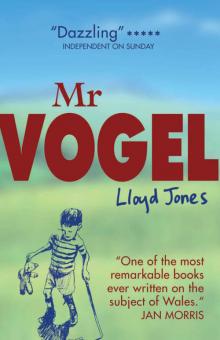 Mr Vogel
Mr Vogel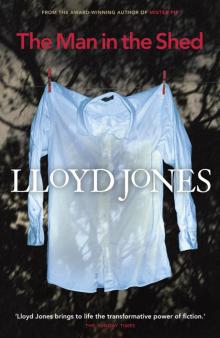 The Man in the Shed
The Man in the Shed Mister Pip
Mister Pip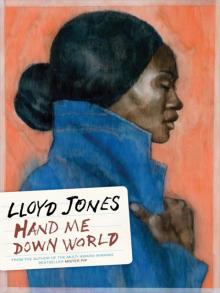 Hand Me Down World
Hand Me Down World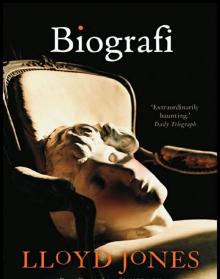 Biografi
Biografi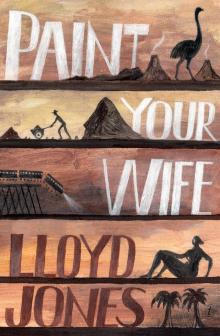 Paint Your Wife
Paint Your Wife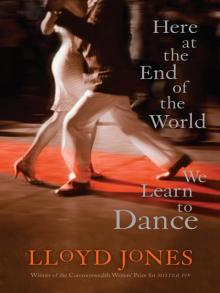 Here at the End of the World We Learn to Dance
Here at the End of the World We Learn to Dance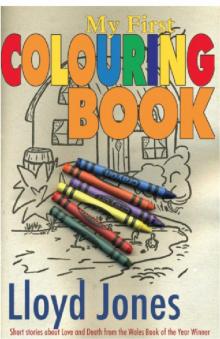 My First Colouring Book
My First Colouring Book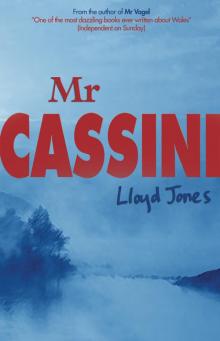 Mr Cassini
Mr Cassini See How They Run
See How They Run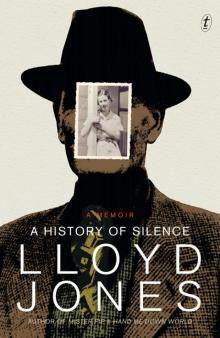 A History of Silence
A History of Silence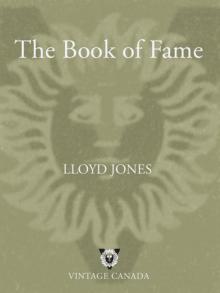 The Book of Fame
The Book of Fame